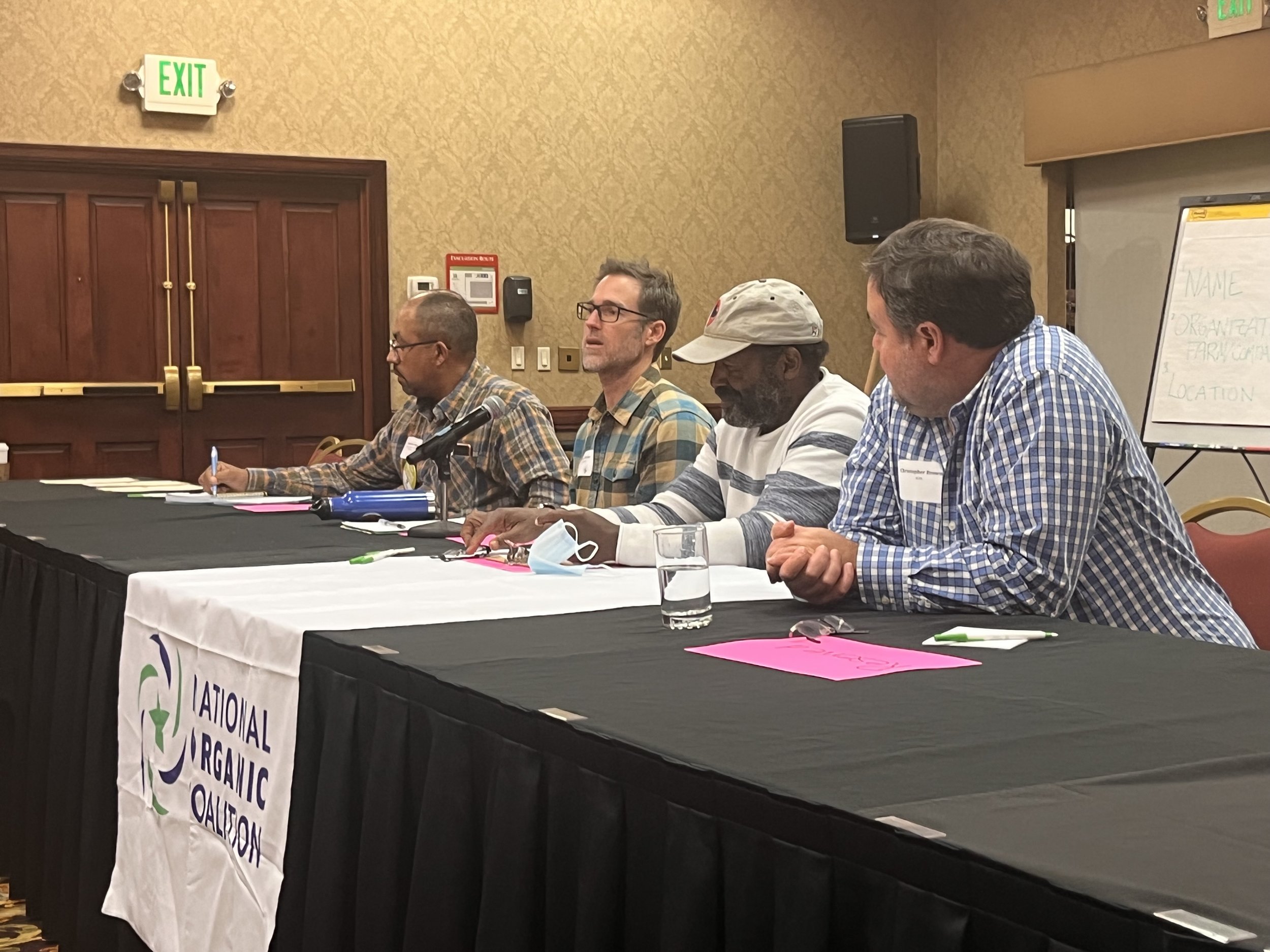Empowering Immigrant Farmworkers & Limited-Resource Aspiring Farmers in the Organic Movement
Farmworkers & limited-resource aspiring farmers are an important part of the next generation of organic farm owners and operators, yet their barriers to entry into farming are immense. This next generation of farmers needs technical assistance, access to land, infrastructure, marketing, and capital. How can the organic movement support those who wish to own & operate their own farm?
A panel hosted during the Pre-NOSB Meeting in Sacramento on October 24, 2022, tackled some of these questions, discussing the specific challenges faced by the next generation of farmers, and ways to support them. Below are some of the highlights from this panel.
Mauricio Soto, Adrian Fischer, Leonard Diggs, and Chris Brown participate in a panel at the Fall 2022 Pre-NOSB Meeting in Sacramento, CA.
PANELISTS
Chris Brown (ALBA) started his career in the investment field in San Francisco. After an MBA at UCLA, Chris worked on economic development assignments in Ukraine, Romania, Georgia and Montenegro and other countries for over 12 years, Chris returned to California to a job at ALBA, a farm incubator and training farm which creates opportunities for low-income field laborers through land-based training in organic farm management, helping them advance their careers or pursue the dream of farm ownership.
Leonard Diggs (Pie Ranch) has managed sustainable and organic farms in northern California for over 30 years, including a 365 acre college farm with annual and perennial crops, a winery, livestock and a mixed species forest. Leonard has also instructed a wide range of agricultural classes and served on numerous agricultural boards and committees in an effort to share his experiences with current and future generations of gardeners and farmers.
Adrian Fischer (CCOF) is the Program Manager for the CCOF Foundation where he supports the current and next generations of organic farmers through financial assistance, education, and technical assistance. Fischer has deep experience in community development and advocacy for organic producers and food systems. A former organic CSA farmer and farmer-educator, Adrian now leads program design, implementation, and partnerships directly supporting organic and transitioning producers. Fischer is Venezuelan American and is bilingual/bicultural.
Mauricio Soto (Viva Farms) has been farming his whole life, beginning in his home of Nayarit, Mexico. Since coming to the U.S., he has worked as a farm-worker, crew boss, and farm manager in California and in the Skagit Valley. He is considered a pruning expert around the valley. Mauricio was also Farm Manager at Viva Farms for several years before deciding to go full-time on his farm, Arado Farms with his wife, Senaida. They specialize in raspberries and strawberries, and have recently become certified.
PANEL TAKEAWAYS
The Importance of Organic Certification:
Being certified organic is necessary for ALBA & Viva producers to compete in the marketplace.
For Mauricio Soto’s direct consumers, the organic label is what makes buyers trust his products.
Marketing Models
Entering the market as small-scale producers is difficult:
most marketers do not want to deal with very small-scale producers.
collaborative marketing can make a big difference in small farmers.
local farmers could be responsible for producing for food banks.
Leonard Diggs & Pie Ranch emphasize the importance of growing culturally relevant, and growing at scale.
Supporting Aspiring & Transitioning Farmers
Access to individualized technical assistance is needed. Farmers benefit from having a personal connection to a technical assistance provider.
Having the opportunity to make mistakes and learn from them without losing everything - a benefit of farming in an incubator program.
CCOF Foundation follows a theory of change and a set of core values to guide their programs. In addition to their education and training programs, CCOF offers the following supports:
Organic Farmer Grant
Hardship Grant
Access to land is one of the main challenges for aspiring farmers. ALBA partners with Kitchen Table Advisors to find land for their farmers. They find small parcels that are not as well suited for conventional and/or row crop farming.
In addition to providing land, education, and programming, Pie Ranch helps farmers build capital: 20% of what farmers pay annually to be in the program is set aside by Pie Ranch. At the end of the 5 years, Pie Ranch matches what has been set aside, allowing farmers to leave the program with some capital.
USDA’s TOPP funding
There is general concern that this funding will perpetuate systemic inequities in who has access to funding and programs.
Leonard Diggs pointed out that though this funding is good, it does not target early stage farmers, or farmers who don’t have enough capital to start farming and/or scale up. Who is this funding meant to support? “I still believe in organic farming and it is a strong anchor. Most of the organic movement is still white farmers. We have to expand the range of impact if we want a change.”
Panelists found value in mentorship programs, and agreed that the emphasis on those in the TOPP program is valuable.

